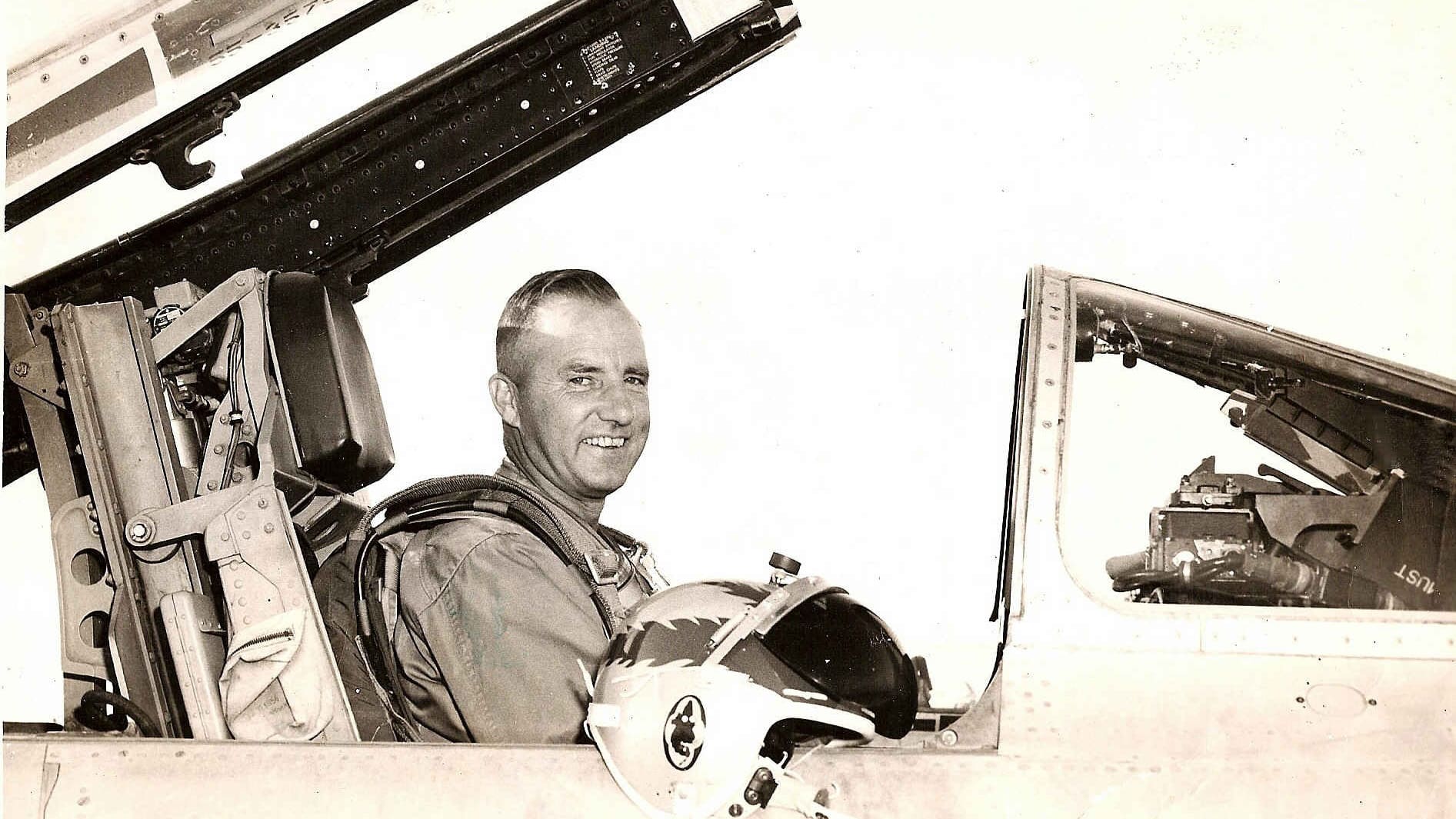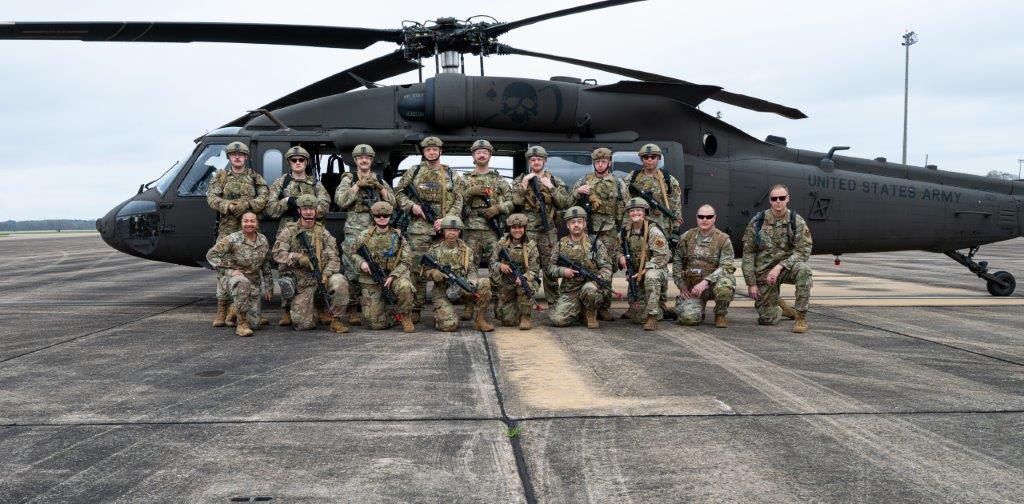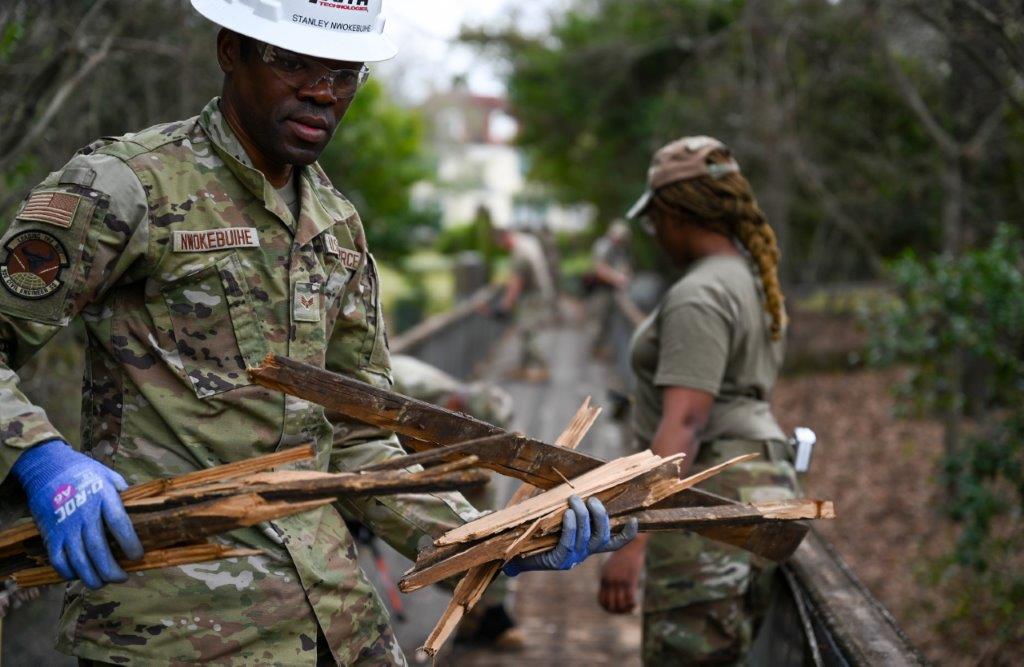A family’s quest: Col. Pete Stewart, shot down in Vietnam 52 years ago, finally coming home

Col. Peter J. Stewart was a pilot in the U.S. Air Force. (Photo/Courtesy the Stewart family)
When Marnie DeHaven met Pete Stewart on a blind date in 1944, she was engaged to another man who was in the Navy and away at sea.
“I did the unspeakable,” she says now of a gut-wrenching decision. “I sent him his ring back, maybe the worst thing I could have done.”
But Marnie was smitten with the dashing Air Force lieutenant. On that first date at the officers’ club, they danced as the orchestra played “I’ll Be Seeing You.”
“I fell in love with him,” she says. “That became our song.”
Those lyrics – “I’ll be looking at the moon, but I’ll be seeing you” — speak to the experience of military spouses everywhere, but they’re particularly poignant for Marnie Stewart, whose beloved Pete was shot down over North Vietnam in 1966, leaving her with six children to raise.
It was a fairy tale love story without a happily ever after. But now, after five decades of questions and few answers, it does have an ending.
“I prayed a lot over the years that this day would come,” says Marnie, now 94, her voice filled with emotion. “And I prayed I’d still be here.”
An Air Force wife
They met on May 27, 1944, set up by friends, while Pete was stationed at Bartow Air Base in Florida as a P-51 Mustang instructor pilot (he had trained with the Army Air Corps at Tuskegee Army Airfield and Maxwell Air Force Base).
There was a connection on that first date, but then Marnie heard nothing.
“I thought, well, that was fun, and I guess I thought I wouldn’t hear from him again,” she recalls. But Pete – who with his parents and siblings had emigrated from Glasgow, Scotland, to Queens, New York — had simply gone home for a visit. There, he told his parents he had met a “good Catholic girl.”
“That thrilled his mother, and we had another date about two weeks later,” Marnie says. “We danced at the officers’ club, and then he brought me home. That was a nice evening. I was glad he hadn’t forgotten me.”
Far from it. About a month later, the two were engaged, and on Nov. 11, 1944, they married.
“I loved every day, every minute I had of that life,” Marnie says of being an Air Force wife. “It’s a great life.”
The Stewarts moved about every three years, with stops including Alexandria, Louisiana; Selma, Alabama; and Japan. Along the way, they built a family – daughters Maggie, Kandi, Beth and Susie and sons Jim and Bill.
The children – and the military life – prepared Marnie for what eventually brought her back to Alabama. For about 10 years, she was a fraternity housemother at Auburn University, and stints at other campuses followed.
“Yes, it was pretty good training,” she says with a laugh. “You had to know what your meals were going to be and where the kids were and make sure they were all OK.”
And they were OK, until Pete, then a lieutenant colonel, left for Vietnam in August 1965.
‘Something had happened’
Bill Stewart, then 6 years old, remembers the day his father left.
“It’s one of those moments that you wish someone would offer you the chance to do all over again,” he says. “When it was my turn to say goodbye, Dad kind of knelt down and wanted to give me a hug. I wanted to be sure he knew I was man enough to take care of the family when he was gone, so I avoided the hug and put my hand out to shake his hand. That’s a moment I would like to take back now.”
Just seven months later, the family, living near Langley Air Force Base in Virginia, learned that Pete might not be coming back. A member of Headquarters, 8th Tactical Fighter Wing, the lieutenant colonel had volunteered to take another pilot’s place on an armed reconnaissance mission over North Vietnam. The F-4C aircraft was shot down.
“It was about 2:30 in the afternoon on March 15, 1966, and I saw the car stop in front of the house, and I knew that something had happened,” Marnie says. “The base commander and a priest came to the house to tell me that Pete had been in the accident in North Vietnam the day before. They told me very little about what happened because it had just happened.”
That lack of information – exacerbated by the controversy of the U.S. even being in the war to begin with — would become the norm for the Stewart family for the next 50 years.
The family, Marnie says, was instructed only to say that Pete was overseas. “At the time, we couldn’t say MIA or anything like that,” she says. “The Air Force told us if they told us too much it would hurt my husband’s chance of survival. … If I had known what I know now I would have gone straight to the newspaper and told them we were leaving people over there.”
Jim, then 16, remembers his mother calling him downstairs to hear the news.
“I vividly remember the ‘he is only missing’ part that Mom talks about, and that we needed to ‘keep the Air Force family’ together in this,” he says. “In other words, don’t go talking to the media about where he was stationed and that he was flying over Laos to North Vietnam, something (the U.S.) was not being public about.” 11-year-old Beth, eavesdropping from the steps nearby, heard the same thing.
The family stayed in Virginia until school ended that June and then moved to Winter Haven, Florida, Marnie’s home. They tried to live a normal life, but there were always questions unanswered about Pete, Marnie says – most importantly, was he dead or alive?
“It’s a terrible feeling, and I wouldn’t wish that on anybody,” she says. “We always hoped that we would hear something.”
More questions, few answers
Life did go on. The children went to school and, Marnie says, the family was well taken care of by the military and her support network of friends and family.
When he graduated from high school a year later, Jim joined the Navy, something he attributes in part to his father. “One thing that he instilled in us was a sense of duty,” he says. “But then again, I did not want to get drafted, especially in the late ‘60s.” Jim spent eight years in the service, but he never was in a war zone.
Beth went to law school at Louisiana State University, returning to Florida to practice after graduation.
A turning point for her came in 1981, when she and Marnie went to Washington, D.C., and met with other families who had loved ones missing.
“We always thought the government was doing everything it could, and I thought that well past my law school graduation,” Beth says. “What changed my mind was hearing these other stories and people pointing out different things that weren’t accurate in their files. … Something just wasn’t right. They weren’t doing everything they could to get these men back.”
Beth began to push for information about her dad and others, and in 1986, she closed her law practice and moved to Washington, where she worked to seek the release of American POWs in Vietnam that hadn’t returned with nearly 600 others during Operation Homecoming.
“I thought the evidence was so overwhelming, so clear, that others were left behind, I was going to shut down my law practice temporarily, for six months or so, and get the answers,” she says.
But she was there for 20 years, working by day as deputy general counsel for a small federal agency and by night consumed with research. With North Carolina Congressman Bill Hendon, she pored over thousands of pages of documents, looking for clues and trying to put pieces together.
“Night after night, we’d scroll through these reels of documents for years and years and years,” Beth recalls. “I also took some trips to Vietnam and Cambodia and a quick excursion into Laos.”
Ultimately, Beth says, the quest was unsuccessful, but it did result in a New York Times best-selling book, “An Enormous Crime: The Definitive Account of American POWs Abandoned in Southeast Asia,” which she co-wrote with Hendon.
“I’m very proud that the book is out there and these stories are out there,” she says. “These men deserve that. My father deserves that.”
Never forgotten
While Beth was forging her law career, Bill was a student at Auburn University, where he was president of Beta Theta Pi fraternity. When the guys were looking for a housemother, he had the perfect candidate.
“I thought my mom would do a great job,” he says. “She has an incredible sense of humor and was always involved with my friends in high school, and they all loved her. I thought this might be really good for her.”
Marnie’s only hesitation was that she didn’t want to interfere in her son’s life at college. “I just told her, ‘When you live in my house, you live by my rules,’” Bill says, laughing.
The new housemother was a hit from the beginning. The fraternity members loved “Mom Stewart,” as they called her, and Marnie found what would be a late-in-life career, first at Auburn, then at houses at Washington and Lee University in Virginia and the University of Georgia.
At Auburn, members of the fraternity noticed her military bracelet.
“The bracelet had Dad’s name on it, the date he was shot down, the general location, and I think the words ‘You are not forgotten,’” Bill says. “After hearing the story from Mom, a number of guys wanted one, so she ordered a bunch and gave them out.”
Pete Stewart, by then a colonel, wasn’t forgotten. Not by Beth, working hard in Washington to find out more and more, nor by anyone else in the family.
“I was always thinking about him in some way, I guess,” says Bill, who lives in Auburn. “Certainly, I was always playing sports and they’d play the National Anthem before games, and I’d tear up just thinking about the patriotism and the warrior spirit he had on behalf of the United States.”
Bill’s first date with the woman who would become his wife was on Pete’s birthday.
“Sloan and I were at Chastain Amphitheatre in Atlanta, and the whole place seemed to get quiet for us,” he recalls. “It’s almost like someone, Dad, looked down and said, ‘This is the girl for you.’”
Eventually, Beth moved back to Florida from Washington and opened up her own law practice. But neither she nor the family ever gave up hope.
“Every day when that phone rang, or the doorbell rang, it crossed your mind,” Beth says. “As the years went on, maybe it wasn’t every day that it crossed your mind, but you never thought he was not coming home.”
Questions, prayers answered
Finally, in March of this year, after 52 years of questions, few answers and much anguish, the Air Force informed Jim that Pete’s remains had been found in Vietnam. They identified him in part by the St. Christopher medal he had with him.
“I haven’t seen it yet, but I did see a picture of it,” Marnie says of the medal. “It was all crunched up, I guess, from the plane when it burned, and it said on the back of it, ‘I’m a Catholic.’ From that, they knew it was him, because the other pilot with him wasn’t Catholic.”
Jim called Bill after getting the news.
“He lives not too far from my mom, so when I got the message that I needed to call him, my first concern was that it was something about Mom,” Bill says. “But it was the news about Dad, and he talked about how he was going to inform Mom first and then tell my sisters.”
For the family, the news was bittersweet – relief that an answer finally was theirs, but sadness that Col. Pete Stewart, officially and conclusively, was dead.
“When he first went missing, we had been both afraid and hopeful that he had been taken as a POW and would be returned at the end,” Jim says. “When that didn’t happen, we were afraid he might be in a jungle POW camp somewhere, and that, we knew, was not something that we wanted anyone, especially our father, to be going through.
“I was both saddened and happy at the same time,” Jim adds. “Mom is still alive to share this with, and we have been afraid that she would not be able to be with us when the word finally came – which we knew would come at some time. … That he perished when the plane went down is hard, but that it was quick and he did not languish in some rotten hell-hole has a measure of comfort.”
Though a private family service was held in the 1980s when Pete’s status was changed from missing-in-action to killed-in-action, a body had not been recovered and it was a presumption of death. Now, Marnie is ready to see her beloved Pete come home and be buried with full military honors deserved of an American hero.
“I think it’s probably going to be the biggest thing that ever hit Winter Haven,” she says proudly.
Pete’s remains, now in Hawaii, will be flown into Tampa on June 16, just two months before what would be his 100th birthday. A funeral mass and full military honors, open to all, will take place in Winter Haven on June 18, and a private family service will follow. This week, the mayor of Winter Haven is expected to sign a proclamation honoring Pete and his service.
Marnie will be taking it all in, at peace at last with knowing what happened to her husband, the great love of her life.
“He was a wonderful father,” she says simply, her voice cracking with emotion. “And he was my best friend.”












